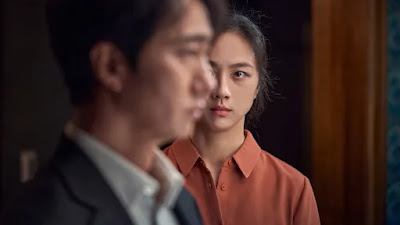Some context. 2022 was meant to be Year Zero for the American cinema: after two years, it finally had a full twelve months to flood the multiplex with delayed or new product and thereby reassert its previous dominance. Yet with the exception of the solid-gold Top Gun: Maverick, it's been another sorry bust - and an illustration of how the American cinema has been comprehensively outthought and outfought by Eastern creatives. Post-pandemic cinema has picked up where Parasite left off in winning the Oscar at the start of 2020. March's RRR was embraced as the rock-'em-sock-'em crowdpleaser the American studios now seem incapable of licensing; the playful worldbuilding of the recent Tamil epic Ponniyin Selvan - Part 1 proved vastly preferable to the leaden nerdery of Dune: Part One. Decision to Leave enters this new, reoriented canon as a thriller operating at an often astonishingly high level, and further proof of a shift in the balance of movie power, demonstrating that Asian cinema has expanded and accelerated where its American counterpart has retreated and shrivelled. Given its abundance of doubles and rhymes (there are two ghostly bands where wedding rings used to be), it feels apt that Park's film has two modes, both more dynamic than the modern American event movie's modes of exposition and action: hard-nosed, relentless clue-hunting, and something more languorous and reflective as the leads begin to circle one another. (Here are the two sides of the Park filmography, unified: the tangled plotting and kineticism of the Vengeance trilogy and OldBoy, and the keen eye for beauty Park revealed in Stoker and The Handmaiden.)
At the film's centre is a relationship that is simultaneously an investigation, one that - even after appearing to have reached a natural point of conclusion - keeps being reopened and revisited. Those clues I mentioned invite interpretation (and reinterpretation) as tokens of love, signs of affection; but they could also be damning evidence, and the considerable uncertainty Park instils in the viewer is whether anything more than a heart is going to be broken here - if the characters can escape this dangerous liaison intact. Around the halfway mark, I became convinced that someone in America would even now be thinking about the remake rights; yet that project is already doomed, because Decision to Leave, forever circling back on itself, serves as its own remake. Park has almost visibly absorbed an entire canon of American cinema - from Vertigo to Basic Instinct, shown up over these two-and-a-half hours as the crudely superficial gruntwork it perhaps always was - and found new ways of doing it all; even a by-the-procedural-playbook scene like the cop's wife making her own decision to leave doesn't play out as it typically would. Amid that hectic procedural framework - which eventually accommodates multiple murders, suicides, and a soft-shell turtle heist the script connects to our hero's midlife slump - Park never loses sight of his leads, who feel like mixed-up, unpredictable, often self-sabotaging people rather than genre-movie clichés; for once, a director appears exactly as fascinated by his characters as they are with one another. Park Hae-Il has the uprightness of a David Strathairn, but the fringe of a Mads Mikkelsen, hinting at the possibility of unravelling; Tang, meanwhile, tops a gorgeously attired cast with soft sweaters and shy smiles, masking a migrant's steely core of self-preservation.
The very great skill of the film lies in how that framework - and the weight of narrative expectation it imposes - is allowed to fade away, effectively leaving us to watch two people ready to follow one another to the ends of the universe: up a mountain, through the night, until the sun goes down. The investigation begets a romance, which in turn begets an adventure - but more seasoned viewers may start to worry whether a love this blinding can only lead these lovers towards a deep, dark, deathly hole. So we look out: at a preponderance of loaded looks and glances, at a hero whose use of eyedrops marks him as vulnerable from the off. (He can barely keep his eyes open, let alone keep one on the ball.) And Park, in turn, looks out for us. In a recurring, idiosyncratic tic, this camera often aligns itself directly behind one character, obscuring our view of the person they're addressing - what textbooks would have down as an egregious blocking error - before correcting itself, as if to remind us of the importance of clear lines of sight, in love and policework both. Consider, too, the film's twin POV shots, first from a dead man's perspective - ants scuttling over the lens - and then from the perspective of the fish laid out for sale at a farmers' market at which cop, wife, other woman and new man accidentally intersect. By this point in Decision to Leave, plot framework has given way to a comprehensive network of surveillance, the film's every gaze - however furtive or fleeting - eliciting meaning. Keep an eye on those you love, Park counsels, and watch while you still can - once, twice, a dozen times over, if what you cherish demands your attention as much as Decision to Leave does.
Decision to Leave is now playing in selected cinemas.

No comments:
Post a Comment